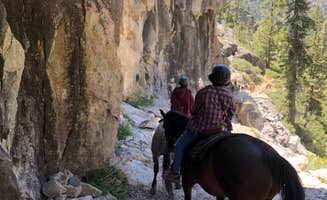Dispersed camping opportunities near Little Lake, California provide options at elevations ranging from high desert valleys at 3,500 feet to alpine meadows above 7,600 feet. The area experiences extreme temperature variations, with summer daytime highs often exceeding 90°F while higher elevation sites can drop into the 40s at night even during summer months. Most dispersed sites require campers to be self-sufficient with water and waste management.
What to do
Explore volcanic formations: Fossil Falls dry lake bed features unique geological formations from ancient volcanic activity. "The fossil falls rocks are basalt mostly but have been pummeled by water and have smoothed and eroded. There's also said to be obsidian flakes on the area," notes Elaine V., who visited Fossil Falls dry lake bed.
Fishing in alpine streams: Several campgrounds offer creek access with trout fishing opportunities. "There was a nice stream you could fish with some trout," reports Mark G. who stayed at Lone Pine Campground. For serious anglers, Kennedy Meadows provides additional options where "Great fishing spot, river is generally stocked with fish on a weekly basis."
Mountain biking on established trails: The Keysville area features extensive trail networks for various skill levels. "With miles of trails and perfect single track for all age groups and abilities!" shares Erin M. about the Keyesville Recreation Site, adding that "The keyesville classic mountain bike race is held every year in the area!"
What campers like
High elevation escapes from summer heat: Camps at higher elevations provide relief from valley temperatures. "It's a great spot to get away from summer heat at 10,000 feet," explains Cheryl C. about Horseshoe Meadow Campground, where campsites are "spread well apart under the pines" surrounding "a large, flat meadow."
Night sky viewing: Areas with minimal light pollution offer exceptional stargazing. Michael A. describes Horseshoe Meadow as having "The night sky splashed with the Milky Way visible most nights," while Pinkie K. notes that at Fossil Falls "stars were bright" due to its remote location.
Solitude and quiet: Less crowded campgrounds provide peaceful experiences. "Since this is a few miles from the actual trail head to Mt. Whitney it has more RV camping sites than tent sites," explains Alan B. who stayed at Lone Pine, while another camper found Kennedy Meadows perfect for "Solitude in the offseason" noting "the campground was empty and we were basically alone."
What you should know
Extreme weather variations: Weather conditions can change rapidly in this area. "It was extremely windy with 50+mph gusts which calmed after the sun went down," reports Darla J. about Fossil Falls. Similarly, Lincoln P. advises to "Make sure your stuff is tied down tight. Upwards for 40mph thought my roof rack was a goner."
Limited services and preparation requirements: Most sites have minimal amenities. "There's been no faucet water there in over 5 years. Pack it in pack it out," explains a reviewer about Kennedy Meadows. For Tuttle Creek Campground, Rick L. notes "Both water and dump station are closed" during certain times of year.
Wildlife concerns: Various wildlife issues affect different campgrounds. "We were invaded by deer mice. They got in our campervan. We killed more than 10 of them," warns Deb H. about Tuttle Creek, adding that "There was a poster on the vault toilets warning about hantavirus in the area." At higher elevations, bear awareness is essential.
Tips for camping with families
Boulder climbing for kids: Some sites offer natural play areas. "There are a couple big boulders the kids can climb on and around," mentions Mark G. about Lone Pine Campground, providing natural entertainment options without electronics.
Flat terrain for easier setup: Look for sites with level ground for family comfort. "Nice and flat area just off the 395 freeway plenty of room for large rigs," reports Jeffrey F. about Fossil Falls. For families with smaller children, Tuttle Creek Campground offers sites where "Most sites are very close to level" according to Leonard H.
Off-season family adventures: Consider less crowded times for a better experience. "Went up during the winter and stayed the weekend... The campground was empty and we were basically alone," shares Stacie M. about Kennedy Meadows Campground, adding "It was some of the best family fun."
Tips for equestrian camping
Trail access for day rides: Horseshoe Meadow Equestrian Camp provides direct access to multiple trails. "Trails to multiple peaks and passes all from this alpine valley," notes Michael A., making it ideal for equestrian camping near Little Lake, California with varying ride lengths.
Seasonal considerations: Plan equestrian trips around seasonal closures and conditions. "Many campgrounds close to each other but not on top. Cast meadow to the west is wonderful for morning walk with coffee," mentions Katie H. about Horseshoe Meadow, which offers excellent conditions for horses during summer months.
Water availability for horses: Water sources vary seasonally and by location. Laura M. notes about Walker Pass that "There are restrooms but any flowing water available," emphasizing the need to bring water for horses at some locations. At Whitney Portal, Elise F. mentions "There are spigots for water" which can be useful for equestrian camping needs.


